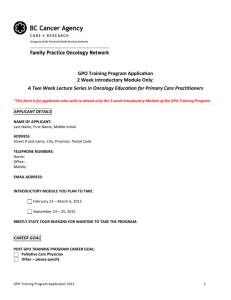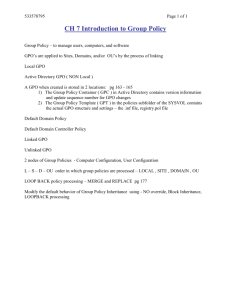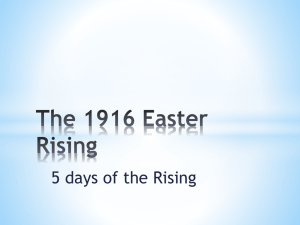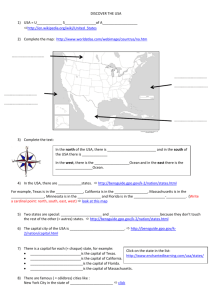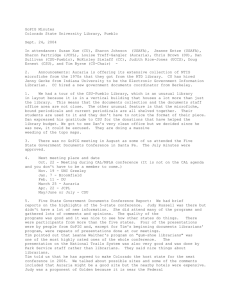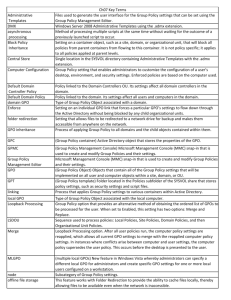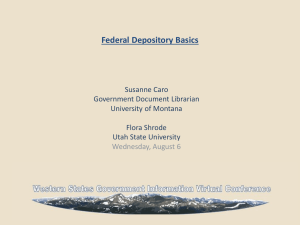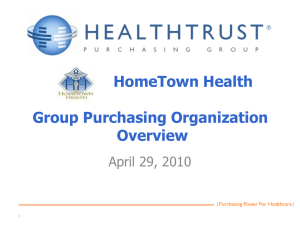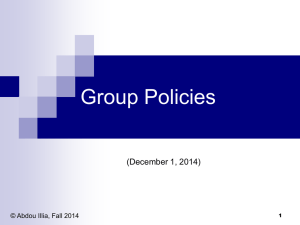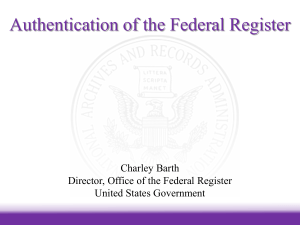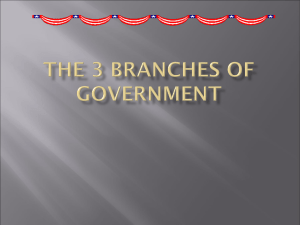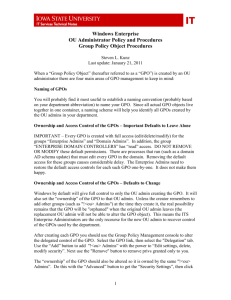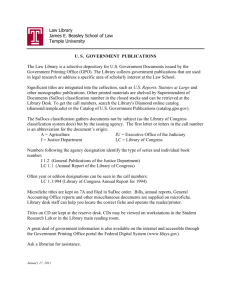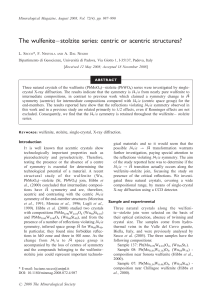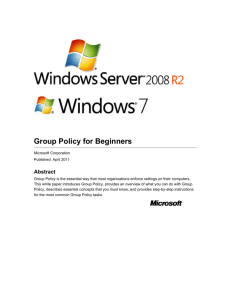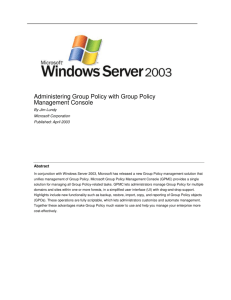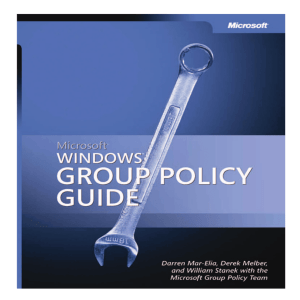To: Librarians - Blume Library
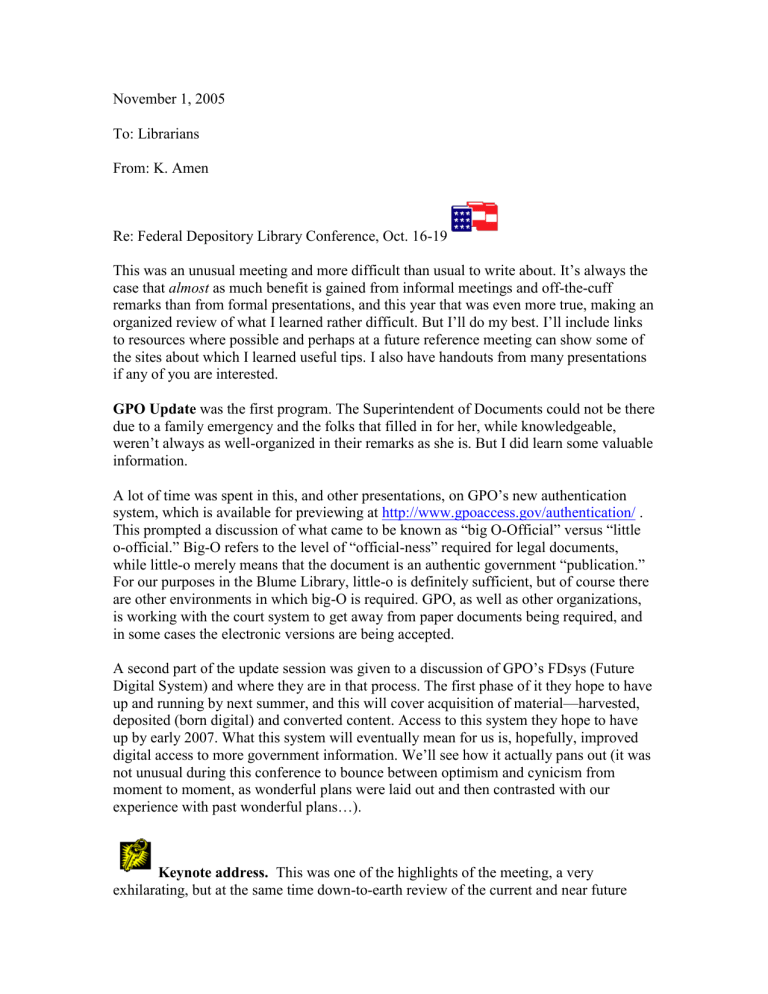
November 1, 2005
To: Librarians
From: K. Amen
Re: Federal Depository Library Conference, Oct. 16-19
This was an unusual meeting and more difficult than usual to write about. It’s always the case that almost as much benefit is gained from informal meetings and off-the-cuff remarks than from formal presentations, and this year that was even more true, making an organized review of what I learned rather difficult. But I’ll do my best. I’ll include links to resources where possible and perhaps at a future reference meeting can show some of the sites about which I learned useful tips. I also have handouts from many presentations if any of you are interested.
GPO Update was the first program. The Superintendent of Documents could not be there due to a family emergency and the folks that filled in for her, while knowledgeable, weren’t always as well-organized in their remarks as she is. But I did learn some valuable information.
A lot of time was spent in this, and other presentations, on GPO’s new authentication system, which is available for previewing at http://www.gpoaccess.gov/authentication/ .
This prompted a discussion of what came to be known as “big O-Official” versus “little o-official.” Big-O refers to the level of “official-ness” required for legal documents, while little-o merely means that the document is an authentic government “publication.”
For our purposes in the Blume Library, little-o is definitely sufficient, but of course there are other environments in which big-O is required. GPO, as well as other organizations, is working with the court system to get away from paper documents being required, and in some cases the electronic versions are being accepted.
A second part of the update session was given to a discussion of GPO’s FDsys (Future
Digital System) and where they are in that process. The first phase of it they hope to have up and running by next summer, and this will cover acquisition of material—harvested, deposited (born digital) and converted content. Access to this system they hope to have up by early 2007. What this system will eventually mean for us is, hopefully, improved digital access to more government information. We’ll see how it actually pans out (it was not unusual during this conference to bounce between optimism and cynicism from moment to moment, as wonderful plans were laid out and then contrasted with our experience with past wonderful plans…).
Keynote address. This was one of the highlights of the meeting, a very exhilarating, but at the same time down-to-earth review of the current and near future
state of digitization, digital storage, and attendant issues. The speaker was Clifford Lynch from the Coalition for Networked Information. Mr. Lynch epitomized the aforementioned optimist/cynic dichotomy, speaking with enthusiasm one moment about the
Google digitization initiative and in the next wondering about what lies in some of the secret details of the agreements between Google and their partners. He feels that there is something of a misperception about the amount of stuff currently digitized, and that there is more available digitally now than we usually think. However random the current corpus of freely available digitized material is, he feels that comprehensive coverage is at least visible on the horizon. However, he also bemoans the shrinking of the public domain due to extravagant copyright-term extension, and feels that the relationship between researchers and pre-1920 material will eventually be quite different than that between researchers and post-1920 material.
More out-there kinds of observations included the possible lack of necessity for metadata with automatic indexing becoming better and better. He also pointed out that not all textual material is being read by humans, that computational indexing, and computational linguistics, are making possible not only the harvest but also the analysis of material by machine agents, especially in the sciences.
The main subject area covered in Mr. Lynch’s talk was storage, and it was pretty breathtaking stuff. He feels that although the information output of our society continues to grow rapidly, it’s not growing as rapidly as storage capacity and systems. In the nottoo-distant future he thinks that we’ll be able to have incredible amounts of text and data on our little iPods, or whatevers. He thinks that high school grads could go off to college soon with complete sets of all kinds of information, complete libraries of material.
In response to a question, Mr. Lynch told us not to worry too much about format migration problems involving PDFs, Word documents and even TIFFs. He thinks there are enough of those files out there that when migration becomes necessary there will be a long window of time in which to accomplish it.
Authentication demo. This presentation gave more details about GPO’s authentication system. Right now they are manually authenticating documents, but they hope to have an automated system going before too long. One thing I learned in this session is that you have to enable pop-ups to see the authentication information, and you also have to have a somewhat advanced version of the Acrobat reader, but it works fine on the one that we have. GPO is starting out with text documents, but acknowledges that other kinds of files—tables, GIS data, programs, images—also need to be authenticated and these will be much harder to handle.
GPO Access Disaster Recovery site. In a wonderful example of how wacky it must be to work for the government, the GPO folks are very excited about their backup system because it will work so much better than the current WAIS-based search system.
For some reason they couldn’t just upgrade the current system, but once the backup is
working properly (hopefully in early spring, 2006) it will take over as the main system until the new FDsys is up. The advantages of the backup system were demonstrated: better search results, longer titles displayed, longer and more extracts for more precise searching, and of course, faster response time.
Small Group Discussions.
The next day’s sessions were very free-form and difficult to summarize. After a brief history and overview session presented by the
Depository Library Council, we were asked to break out into 2 subject-oriented discussion sessions followed by a “type of library” discussion session. The four subject areas were: Library roles in a non-exclusive environment; Managing collections and delivering content; Adding value; and Deploying expertise. These are the areas Council feels to be important to the future direction of the Depository program. I chose the
Managing collections and Adding value sessions. The sessions were very interesting and it was great to meet and discuss issues with a wide variety of librarians. On the final day of the conference the Council summarized the themes and major ideas which came out of each of the discussions, most of which were in line with my notes, at least for the sessions I attended. (The “Small Academic” type-of-library breakout was not as useful a discussion; most of the attendees agreed that more focused discussion points were more productive.) These are the ideas the Council highlighted:
Libraries in a non-exclusive environment: foster collaboration and communication among digital collectors develop talking points for advocating importance of government information create customizable interfaces for government data
Managing collections: we advocate digital deposit keep a registry of digital projects establish a pilot “light archive” (as opposed to a “dark archive”) collaborate on digital projects
Adding value: leverage expertise by developing a registry of experts give exceptional service to the public help with fugitive documents problems exploit the expertise of others, such as Google
Deploying expertise: work toward coordinated, networked reference services facilitate learning market government information expertise
Focus group on managing digital collections. I was invited to participate in a focus group which is part of a study being conducted by the Univ. of North Texas and the
California Digital Library. I felt like a minnow in the room, since the other participants
were from places like the Michigan State Library, Yale, University of Colorado, etc., who have huge collections and lots of experience with digitization. But I was invited to provide the perspective of the minnows who want to participate, and I think I did that fairly well. I also learned a lot from the discussion. Among the tidbits I picked up: Yale
Law Library is developing a collection of Supreme Court briefs, a class of publications that no one has; digital material should be integrated into a library’s collection development and other policy documents; and an idea: get scholars on-campus to contribute research to our server. The last idea might be desirable since several of the participants talked about difficulties at their institutions in dealing with different levels of administration. A broader participation helps out in that regard.
GODORT Program on FOIA. The Monday evening GODORT program, while not an official part of the conference, is always interesting and informative and it was especially good this time. There was a panel of 3 speakers with FOIA expertise: Robert
Gellman, a columnist for Government Computer News; Meredith Fuchs, counsel for the
National Security Archive at Georgetown Univ.; and Patrice McDermott, from ALA’s
Washington office. They gave a provocative, informative and inspiring (though also occasionally depressing) review of the current FOIA scene, why the law is important, conflicts between FOIA and privacy and how to approach them, and what is happening
(or not) with the E-FOIA law. Next year is the 40 th
anniversary of FOIA and they urged commemoration of that in our libraries. I think it would make a good display topic.
Web at Risk. This presentation was given by the ladies who ran the focus group the day before, and was aimed at libraries higher up the digitization ladder than us, but I got some good ideas from their talk, namely a suggestion for our local documents group to perhaps look at digitizing some local government items.
Homeland Security Digital Library.
This presentation by the librarian at the
Naval Postgraduate School was very interesting. The HSDL is a great aggregator of information on all aspects of security, terrorism, and law enforcement. It is not openly accessible as a site (although individual items are findable through Google and also are linked from the librarian’s excellent subject pages , which are included in my Subject
Index and to which I almost always go first for military information) but the librarian told us to email them and they should give us individual access. I have emailed them but haven’t heard back from them yet. She also said that academic programs in this area can get wider access to the site, and I thought about the Center for Terrorism Law. One item that she mentioned of particular interest is that the theses written by students at the
Postgraduate School, unless they are classified, are readily available and are often substantial analyses of important topics.
Franklin (catalog) demo.
The demo part of this presentation didn’t work because they did some indexing of the database the day before and everything was fouled up. But we got a good preview of this catalog, which will take the place of the Catalog of
Government Publications (which in turn took the place of the Monthly Catalog). It is the public end of GPO’s new ILS which has been in the works for years but is hopefully almost ready to go “live.” When it finally does come online there will be the potential for some great things with it, including the pushing of catalog records to depositories. No doubt this will not work as smoothly as getting the records from Marcive, but it would certainly be a savings. That is a decision we will probably have to make some time in the next year if the GPO system comes up as expected.
GPO Access RSS feeds. This presentation renewed my desire to put links to RSS feeds on several of my pages and I was able to do that on a few of them already. The GPO feeds are on my Government Information Librarianship page (along with a feed from freegovinfo.info) and on my U.S. Government Sites page. I don’t exactly understand how the coding works but will be glad to share my empirical (read: cut-and-paste) knowledge with any of you who want to put this kind of information on your pages.
Stat-USA agency update. The best news to come out of this presentation is that they are supposed to let us know how to configure an IP-address-sensitive login so that we won’t have to use the password to get to the parts of the site with restricted access. (No word on this yet, however.) As usually happens when I go to this presentation, I get very enthused and then don’t find their content is particularly useful for us. I think they just have very enthusiastic presenters who are very good salespeople. But they did show us how to make customized, exportable tables of export and import data.
GPO operations. This information sharing discussion is always worthwhile and I always pick up good tips here on day-to-day operational issues. Some tidbits learned this time:
No more non-Congressional MF is being distributed, but Congressional fiche is continuing
GPO is working on CD-ROM format migration, first converting titles that do not have online equivalents
They are awaiting approval on a pre-1976 cataloging project, which will make records available by batch or FTP; they are taking prioritization suggestions
The new ILS catalog (Franklin) will include brief records with URLs when these are known
They have been working on collecting material for their proposed National
Collection (of last resort) in advance of actual Joint Committee on Printing approval (JCP approval is pending on many of their current projects; since they are changing how they do business so fundamentally there are legislative changes involved)
Browse Topics lunch. I had another productive lunch meeting on Tuesday with contributors to GPO’s
Browse Topics web pages. It is a partnership between GPO and
Oklahoma State Univ. I basically wanted to see how rigorous their standards were and
whether I thought I could meaningfully contribute a page to the collection. I decided that
I could, since they seemed very approachable and subscribe to the idea that it’s better to get some resources up there and let people contact you if you’ve left off anything major.
So I volunteered to do a page for Languages, which I emailed you all about last week. I submitted it to them this morning.
Public Printer Bruce James. The last morning was spent reviewing the ideas brought out in the small group discussions (see above) and with a talk by Mr. James, who always has interesting tidbits for us. This year he seems to think that GPO will be in a new facility soon. Their old building is just too expensive to maintain. He also hopes to retrain many current employees on the printing side to do digitization and other work in a more up-to-date agency. He wants to wait until the Depository Library Council has finalized its view of the future look of the program (which they hope to have done by late spring, next year) before he takes proposed Title 44 revisions (the needed legislative changes referred to above) to Congress. And he plans to have 70% of the total Depository corpus (back to the beginning) digitized by the end of 2007. Ambitious, but, going by Mr. Lynch’s remarks from the first day, it should be doable.
All in all it was a stimulating conference, and while not as heavy on the educational side as usual, it was better as far as meeting people, networking and exchanging ideas. (I definitely got to be better friends with the Houston-area librarians who watched Monday night’s Astros game in my room . And just to let you know that the socializing wasn’t all frivolous, I went with another group to see an excellent production of
Othello at the National Shakespeare Theatre on Tuesday night, when there wasn’t a baseball game.)
